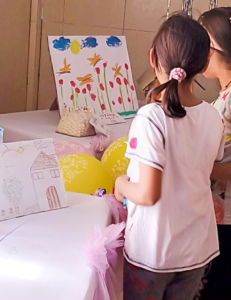The project’s main aim is to provide vital educational services and child protection to vulnerable Syrian children who have been affected by conflict and displacement in Al-Raqqa city. This includes the establishment and equipping of two education centers, where a range of educational initiatives such as Homework Help sessions, access to a Book Bank, Life Skills sessions, and Early Childhood Education programs will be offered. The project also involves enhancing the infrastructure of Child Care Centers, building the capacity of teachers and education personnel, and providing financial support to sustain educational efforts. Additionally, the project includes distributing stationery kits, implementing distance learning, and conducting hygiene awareness campaigns during the COVID-19 response. Integrated Psychosocial Support (PSS) activities will focus on addressing the emotional well-being of the children, helping them cope with the challenges of conflict and displacement. In summary, the project aims to create a supportive and comprehensive environment that caters to the educational and emotional needs of vulnerable children in Al-Raqqa city.

Services Provided :
- Establishing and equipping two centers in Al-Raqqa city with necessary supplies and equipment.
- Operating a Book Bank to enhance access to educational materials.
- Facilitating Life Skills sessions to empower children with essential life skills.
- Providing Early Childhood Education (ECD) programs for young learners.
- Offering transportation support to ensure students’ access to education.
- Establishing two Teachers Learning Cycles (TLCs) for continuous professional development.
- Conducting minor rehabilitation work to improve targeted Child Community Centers (CCCs).
- Building the capacity of 35 teachers and education personnel through comprehensive training.
- Providing teacher stipends and covering CCCs’ operational costs to sustain educational activities.
- Distributing stationery kits for both students and teachers.
- Implementing distance learning solutions to ensure education continuity, especially during the COVID-19 response.
- Raising awareness and promoting hygiene practices among the targeted students.
- Offering integrated Psychosocial Support (PSS) activities within the centers to address the emotional well-being of children.

